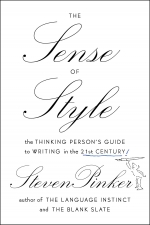
What is the best book you’ve read recently? When I was an undergrad, two PhD students told me they didn’t have one, because they were too busy reading papers. I found this alarming because I loved reading books, and disliked reading papers. Would I need to sacrifice reading for fun to stay in science?
Recently, my co-supervisor Michael Jennions sent me a book that has alleviated these fears: The Sense of Style: The Thinking Peron’s Guide to Writing in the 21st Century, by Steven Pinker[1]. Steven Pinker is a psychology Professor and the chair of the American Heritage Dictionary Usage Panel. He thinks academia is rife with bad writing. This makes papers tedious to read, even for professors in the same field. In The Sense of Style, Pinker uses linguistics and cognitive science to explain the style of writing we should be aiming for, and why it is so hard to achieve.
Why Writing Well is Hard
“Man has an instinctive tendency to speak, as we see in the babble of our young children, whereas no child has an instinctive tendency to bake, brew, or write.” – Charles Darwin, as quoted in The Sense of Style (p. 50[1])
Writing translates the web of ideas in our mind into a string of words. The reader then parses the sentence into a tree of syntax, after first holding the beginning of the sentence in her working memory. Cognitive science tells us that our working memories are prohibitively small, so Pinker details a number of tricks to help readers parse sentences more easily and avoid ambiguity. But, as Pinker points out, “it’s hard enough to formulate a thought that is interesting and true” (p. 137), let alone write these thoughts coherently. Style guides are therefore guides on how to revise, rather than on how to write.
“Most writers polish draft after draft. I rework every sentence a few times before going on to the next, and revise the whole chapter two or three times before I show it to anyone. Then, with feedback in hand, I revise each chapter twice more before circling back and giving the entire book at least two complete passes of polishing. Only then does it go to the copy editor, who starts another couple of rounds of tweaking.” – Steven Pinker, reminding us that writing is hard, even for best-selling authors (p. 136 – 137[1]).
Pinker thinks that academia is filled with opaque writing because of a failure to appreciate the depths of other people’s ignorance. He refers to this phenomenon as “The Curse of Knowledge”, and it is backed up by experimental psychology (and the experience of helping your elderly relatives with their computers). When we are familiar with a topic, we package information into chunks and forget what it was like before we consolidated this information. We then fail to explain ourselves properly and, as a result, our reader is left bewildered by jargon. Sometimes I thought The Sense of Style provided an unintended demonstration of this problem: the middle of the book is filled with technical terms, and diagrammed sentences, that were completely absent from my Australian education in the late 90s and early 2000s (I have asked around to make sure I am not merely forgetting my formal education). I therefore grew frustrated by having to frequent the glossary. Pinker admits that the curse of knowledge is very difficult to overcome, so showing your drafts to people that are unfamiliar with your topic is the best safeguard.
What We Should Aspire To
“My task, which I am trying to achieve is, by the power of the written word, to make you hear, to make you feel – it is, above all, to make you see.” (Joseph Conrad, 1897)
Pinker thinks that academic writing is opaque because it is written in self-conscious, rather than classic, style. Classic style directs the reader’s gaze, like the director of a film, to tell a story about a subject, allowing the reader to reach the same conclusion as the writer. It avoids unnecessary use of meta-concepts (concepts about concepts, such as “frameworks” and “level”), because the reader cannot picture them. It also limits the use of hedging words (e.g. “almost”, “apparently”, “perhaps”), because they distract the reader from the subject. Pinker thinks these words are so over-used in science that they have become a tic.
Classic style aims to both create pictures in the reader’s mind, and present them in a coherent order. Advice to “avoid the passive voice” is simplistic because it focuses on the first aim but neglects the second; passive voice removes characters (i.e. pictures) from a scene, but sometimes this is necessary. By starting the sentence with the done-to, rather than the doer, passive voice changes the order in which events are presented to the reader. Good writers will therefore use both active and passive voice to write clear and coherent prose.
Overall impression
I highly recommend The Sense of Style. Through its 500 pages, Pinker sprinkles enough jokes, amusing examples, and interesting science to keep the reader engaged. There are many practical tips for improving your writing (e.g. read your drafts aloud). Reading this book will not turn you into a good writer, because knowing what you should do is easier than actually doing it. But it will make you a better editor, by providing diagnostic tools for clumsy sentences and incoherent prose. Pinker provides a compelling case for how we should aspire to write, which is far clearer than the accepted standard in science. On the downside, the middle of the book gets bogged down in more technical detail than I required; the longest chapter is devoted to the rules of grammar, most of which I had never heard of, and are subsequently dismissed as unimportant anyway. If most careful writers ignore a rule then it is not a rule at all, and you will not lose the trust of readers by ignoring the sticklers who tell you otherwise. Pinker says that trying to memorise all the idiosyncrasies of the English language is neither the most effective nor the most enjoyable way to improve your own writing. What does he suggest? Read for pleasure, and pay attention to how careful writers write.
So, what is the best book you’ve read recently?* Let me know, and we could choose it for book club.
1. Pinker, S. (2014). The Sense of Style: The Thinking Person's Guide to Writing in the 21st Century. New York, NY: Penguin.
*mine is We Are All Completely Beside Ourselves, by Karen Fowler.






 RSS Feed
RSS Feed